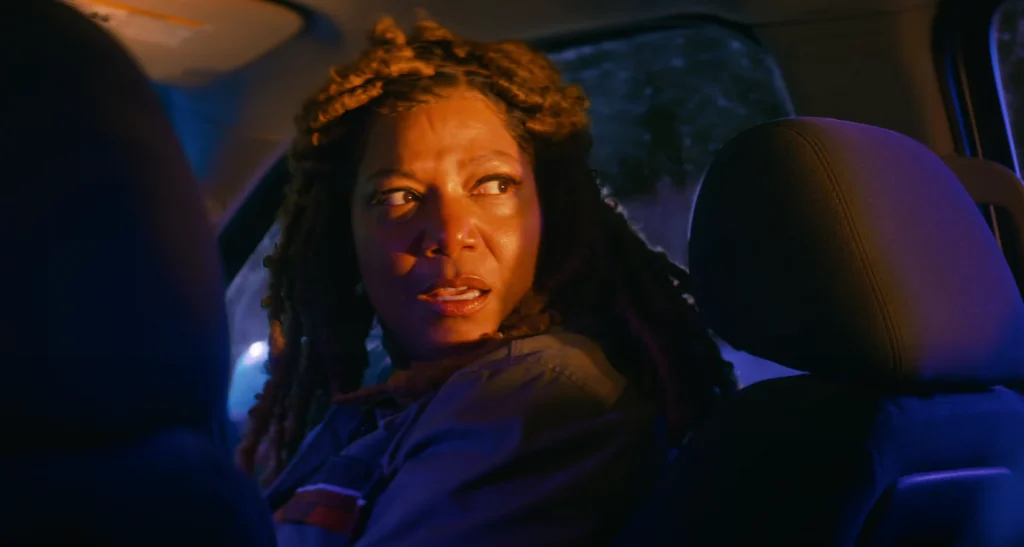In this exciting but ridiculous Netflix thriller, producer-star Queen Latifah plays a grandmother protecting her family from predators.
During a pivotal scene in “End of the Road,” Queen Latifah yells, “Nobody interferes with my family!” while pointing a gun at the antagonists. It’s one of several instances in this Netflix thriller where the blatant use of unadulterated cliché has an unintended humorous effect. Millicent Shelton’s slick but ridiculous film loses its social critique edge by depicting an African American family’s cross-country journey in cartoonishly broad terms, endangering them with crazy and/or criminal “crackers” at every turn. This is a quick route from the ordinary to the preposterous.
With a formulaic, manufactured screenplay, the director and performers do their best — well, maybe not their best, but their competent professional duty. However, the outcomes are disappointing, coming off more like overripe cheese than tense suspense, or even guilty pleasure terrain.
Story line
The Freemans — a choice of name that signals the script’s heavy hand — are introduced just as they’re saying goodbye to the only home some of them have ever known. After her husband’s death from cancer, Brenda (Latifah) can no longer afford to stay in their spacious Southern California house. Already grieving their father, teenage daughter Kelly (Mychala Faith Lee) and preteen son Cameron (Shaun Dixon) are further distressed by the prospect of moving to Houston, where their grandmother lives. “Just so you know, you’re ruining my life,” Kelly helpfully informs Mom while being pried off the boyfriend she’s leaving behind. Sharing driving duties on the long haul is Brenda’s antic ne’er-do-well brother Reggie (Chris Bridges, aka Ludacris).
The projected three-day journey would be challenging enough considering the competitive nature of this quartet. And Kelly gives two leering young yokels (Jasper Keen, Micah McNeil), who go unnamed but could just as easily be called Cletus and Jethro, the well-deserved middle finger at a gas station, putting the big, broad, very Caucasian hinterlands on the wrong foot. They pursue the Freemans through a lonely desert road, briefly scaring them.
The family relaxes in a motel that night after their close encounter with “nasty, stupid white lads” until they hear a gunshot from the room next to them and the sounds of a violent struggle. The attacker flees, and Brenda, an emergency room nurse, is unable to save a man named Jesse Luken who is in critical condition.
The following morning, Brenda and company happily set out on the road once more after being questioned by local police. However, the Arizona State Troopers’ Captain Hammers (Beau Bridges), who arrived late, is not pleased that they have fled the scene. The cash duffel bag that the dead man had stolen has now been found by Reggie, who is often a source of rash terrible ideas. The Bad Guys apparently learn about this right away and use threats to blow up Brenda’s cell phone before robbing a family member and using them as ransom. An entire trailer park full of inbreds who resemble “The Hills Have Eyes Goes to Burning Man” quickly foil her attempt to return the money. There are further issues as well as multiple screeching automobile chases.
Written by Christopher J. Moore and David Loughery, “Hot Rods to Hell,” a minor camp classic from 1966, in which Dana Andrews and Jeanne Crain’s upstanding family was threatened by lunatic offenders across the country, is reimagined as a race-relations-focused film in “End of the Road.” All remaining sharks have already been jumped by the time Frances Lee McCain appears as the evil Ma to Bridges’ nice old boy Pa Kettle. It turns out that the shocking identity of local criminal boss “Mr. Cross” (as in “burning cross,” one presumes) was not at all shocking.
Director Shelton
Shelton, a seasoned episodic director who got his start in music videos, provides polish and energy, albeit perhaps not the proper type for this story: the movie glides along smoothly but lacks a sense of white-knuckle dread or visceral action. And the choice to light nocturnal desert vistas in garish neon hues, as if for a rave, soon loses the attraction of the warm visual palette. There is a general lack of aptitude for thriller atmospherics, which is further highlighted by the regular bombast of Craig DeLeon’s soundtrack and the use of several previous pop tracks.
Given how talented Queen Latifah is, it’s frustrating to see her star in (much alone produce) such cheap entertainment, where any other actor could have filled the generic character of a mother fighting for her children. The former Ludacris, another outstanding actor who broke into the hip-hop scene, marginally improves a Chris Rock-like part — the motormouthed would-be problem solution who instead creates issues — but he isn’t quite able to atone for the stupid choices his character consistently makes. Even while the supporting roles are brilliantly acted and many of the characters fit some sort of stereotype, the senior Bridges does his damnedest to downplay the trope.
